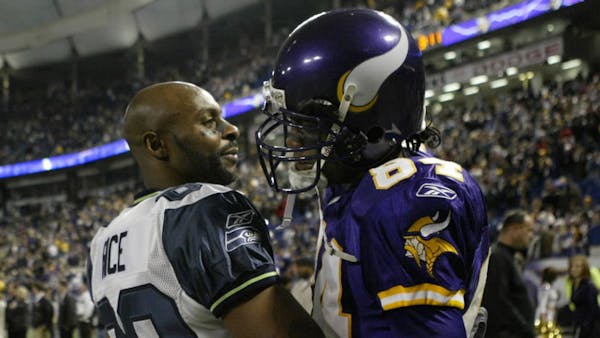NEW ORLEANS - For a 36-year-old guy at the pinnacle of his professional life, Matt Birk spent an inordinate amount of his Super Bowl week talking about the day he will die.
More specifically, what will become of his brain on the day he dies.
"Terrible pun, but it's a no-brainer," said Birk, who will donate his brain to a Boston University medical school that studies chronic traumatic encephalopathy (CTE), a brain disease that can be caused by repetitive head trauma and has been discovered in several deceased NFL players.
"Once you're gone, you're gone," Birk added. "And if some of your organs or body parts can help somebody else or help further the understanding of the effects of football, then I'm all for it."
The St. Paul native has been banging helmets on football fields since the late 1980s. He played at Cretin-Derham Hall, Harvard, the Vikings for 11 seasons and the Baltimore Ravens for the past four. On Sunday, he'll face the San Francisco 49ers in his first Super Bowl, 14 years after falling a game short as a backup rookie tackle with the 1998 Vikings.
Nothing, Birk said, can happen in Super Bowl XLVII to make him decide that night to retire from the NFL. But he knows the day is coming soon, possibly as early as the upcoming offseason. And, yes, like a lot of his peers, he's worried. Worried about what he's walking toward as he walks away from decades of repeated hits to the head in a sport he has loved his entire life.
"You just don't know, that's the thing," said Birk, who has had three concussions that he knows of since high school. "Yeah, it's scary."
Birk worries when he looks at former players such as Junior Seau and Dave Duerson and how they killed themselves with gun shots to the chest so their brains could be preserved and studied. Both players were found to have high levels of CTE in their brains.
"When you think of suicide, you don't think that someone would think it through like that," Birk said. "They had something wrong with them and they knew it, but they also wanted to contribute their brains to a study."
More than 4,000 former players have now joined together to sue the NFL, claiming the league didn't do enough to protect them from multiple concussions or make them aware of the long-term cognitive effects of head injuries.
Birk admits the numbers and the attention probably causes him to overthink whether he's developing symptoms.
"Sometimes you worry about it, especially if something happens like you can't find your car keys," Birk said. "You think, 'Oh my gosh.' You overreact a little bit. You think, 'Is this from football? Is this why I can't remember why I came into this room?' Of course, it's not. Especially if you're a parent. You have mush brain if you're a parent."
Should parents let kids play?
Speaking of which, even President Obama has weighed in on the hot topic of parenthood and football. He told the New Republic that if he had a son, he isn't so sure he'd let him play football.
Birk disagreed.
"I'll let my sons play when I think the time is right," said Birk, who has six kids. "My personal belief is that tackle football isn't really a grade-school game. ... I have three sons. Once they get to high school, and if I feel like they're physically able to go out there and compete and not put themselves in danger, then yeah, absolutely, they can play. Football teaches a lot of life's most important lessons."
Former Vikings receiver Cris Carter was more upset with what Obama said.
"He's the most powerful man in the free world, but I would tell him to be a little careful on trying to be an expert on everything," said Carter, now an ESPN analyst. "I played 16 years in the National Football League and I didn't have one concussion. What Obama doesn't realize is football's not a game about getting hit. It's a game about not getting hit. That's how you avoid it and that's how you keep playing.
"It is the most popular sport for a reason. You look at some of the other sports. I mean the numbers are horrific in soccer, girls injuries. Do we have a dilemma? Yes. Are we going to get it better? Absolutely. But we do have the best game going. Obama! And I voted for you twice."
Man of principle to the end
Birk never has been afraid to take a stand. He's challenged the NFL to take better care of former players in need. He's argued that marriage should be defined as between one man and one woman. He's a pro-life activist. He won the 2011 NFL Walter Payton Man of the Year award for his community work.
As he heads into what might well be his final NFL game, Birk knows it won't be long before he moves his family back to the Twin Cities for good. There's a part of him that's still surprised he didn't finish his career as a Viking.
"I guess I kind of thought I would," he said. "But I never knew when my career would end. I'm from there. I was pretty happy. I didn't foresee leaving and never said, 'I gotta leave. I want to leave.'"
Birk missed the last four games of the 2004 season because of a sports hernia. In 2005, he was willing to play through a hip injury, but only if the Vikings guaranteed the remainder of his contract.
"Probably rightfully so, from the Vikings' perspective, they couldn't do it," Birk said. "Thankfully, they didn't and I had that surgery. Since then, I've played seven years and haven't missed a game. I don't think that would have happened had I tried to play through that stuff. My career never would have lasted to where I am right now."
